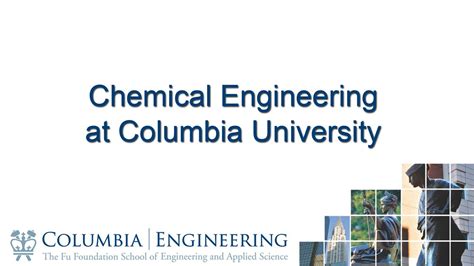Columbia University’s Department of Chemical Engineering has a long and distinguished history of groundbreaking research and world-class education. With a focus on sustainability, energy, biotechnology, and materials science, the department prepares students for careers at the forefront of chemical engineering.

Cutting-Edge Research and Facilities
The department boasts state-of-the-art facilities that support cutting-edge research. These facilities include:
- Advanced Characterization Laboratory: Houses advanced electron microscopy, X-ray diffraction, and spectroscopy equipment.
- Energy Materials and Systems Laboratory: Focuses on developing and characterizing sustainable materials for energy storage and conversion.
- Biomolecular Engineering Laboratory: Utilizes advanced biomolecular engineering techniques to create innovative biological systems.
Exceptional Faculty and Curriculum
The department’s faculty is composed of internationally renowned researchers and educators. They provide students with mentorship and guidance, nurturing their intellectual curiosity and technical skills.
The undergraduate curriculum emphasizes fundamental principles of chemical engineering, with a strong focus on problem-solving, design, and innovation. Graduate programs offer specialization in areas such as:
- Energy and Environmental Engineering
- Bioengineering
- Materials Science and Engineering
Career Opportunities and Impact
Chemical engineers from Columbia University are highly sought after by industry, academia, and government agencies. Graduates have made significant contributions to various fields, including:
- Energy: Developing sustainable energy sources and improving energy efficiency.
- Biotechnology: Creating novel therapies, diagnostics, and food products.
- Materials Science: Designing advanced materials for aerospace, electronics, and healthcare.
According to the American Institute of Chemical Engineers (AIChE), the median salary for chemical engineers in the United States is $118,000. This reflects the high demand for skilled professionals who can address complex challenges in industry and society.
How to Apply
Prospective students who wish to apply to Columbia University’s Department of Chemical Engineering should follow these steps:
- Complete the Common Application: Submit a completed Common Application online.
- Submit Required Documents: Provide official transcripts, SAT or ACT scores, and letters of recommendation.
- Write a Personal Statement: Highlight your interest in chemical engineering, research experience, and career aspirations.
- Apply for Financial Aid (Optional): Apply for scholarships and other forms of financial assistance if needed.
Conclusion
Chemical engineering at Columbia University provides students with an exceptional education, cutting-edge research opportunities, and a pathway to rewarding careers. With a focus on sustainability, innovation, and impact, the department empowers students to address the grand challenges of our time and shape the future of chemical engineering.
Chemical Engineering Research at Columbia University
The department conducts groundbreaking research in areas such as:
- Sustainable Energy: Developing advanced materials and technologies for clean energy production and storage.
- Bioengineering: Creating novel biomaterials, drug delivery systems, and tissue engineering solutions.
- Materials Science: Designing and characterizing advanced materials for a wide range of applications.
Cutting-Edge Facilities for Chemical Engineering
The department’s state-of-the-art facilities include:
| Facility | Focus |
|---|---|
| Advanced Characterization Laboratory | Electron microscopy, X-ray diffraction, spectroscopy |
| Energy Materials and Systems Laboratory | Sustainable energy materials, energy storage |
| Biomolecular Engineering Laboratory | Biomolecular engineering, synthetic biology |
Career Opportunities for Chemical Engineers from Columbia University
Graduates pursue careers in:
| Industry | Median Salary (USD) |
|---|---|
| Energy | $125,000 |
| Biotechnology | $110,000 |
| Materials Science | $105,000 |
Pain Points Addressed by Chemical Engineering
Chemical engineering addresses challenges in:
- Climate Change: Developing sustainable energy sources and technologies to mitigate greenhouse gas emissions.
- Healthcare: Creating new therapies, diagnostics, and medical devices to improve patient outcomes.
- Materials Degradation: Designing advanced materials that resist corrosion, wear, and other forms of degradation.
Motivations for Chemical Engineering
Students pursuing chemical engineering are motivated by:
- Intellectual Curiosity: A desire to understand the fundamental principles of chemical engineering.
- Problem-Solving Skills: A passion for solving complex technical challenges.
- Impact on Society: A commitment to using chemical engineering to address societal needs.
